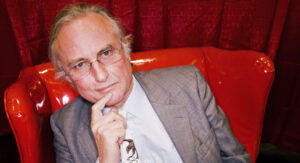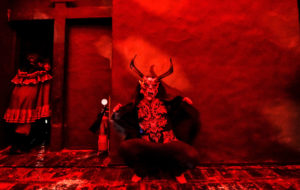The worst sort of books make you feel clever without actually making you more so. They flatter your intelligence, encouraging you to nod along in smug agreement at some faux deep observation, giving you a sense of achievement without having to do the sort of work that achievement rightly demands. Right up there with the very worst of them is Khalil Gibran’s The Prophet.
First published in 1923, and now a century old without ever having been out of print, The Prophet is one of the best-selling books of all time. God knows why, I want to say. But, unfortunately, I think I do know why. There is nothing people want more than the illusion of sharing in the readily profound. Especially when it is little more than a dressed-up version of what they already know. Beloved by wedding planners and popular at secular funerals, it is the lift music of the Abrahamic traditions. Gibran’s The Prophet is a shallow person’s idea of what deep looks like.
Its aphoristic style is the perfect vehicle for this sort of flattery. You don’t have to read the whole book or concentrate on some kind of extended argument. The promised wisdom is instantaneous: “Love one another, but make not a bond of love. Let it be rather a moving sea between the shores of your souls.” I can feel the ick rising in my stomach.
Gibran has an ear for what profundity is supposed to sound like. He is often doing that thing where opposites are knowingly affirmed: I am a man but yet not a man, they are your children but not your children. Hegel, this isn’t. There is no underlying philosophy.
Born in Lebanon to Maronite Christian parents, Gibran emigrated to the United States with his family at the age of 12. Coming from a place where sectarian religious division was a fact of daily life, he quite understandably developed a life-long hatred for doctrinal religion as opposed to spirituality. For Gibran, as for many in the West today, religion divides, but spirituality unites. His preference for oceanic metaphors of universal immersion into the infinite — the sea, the sky, etc — reach for a sense of the numinous that does not rely upon the kind of theological divisions that have set the Middle East at violent odds with each other.
“I love you, my brother, whoever you are – whether you worship in a church, kneel in a temple, or pray in your mosque. You are I are children of one faith, for the diverse paths of religion are fingers of the loving hand of the one supreme being, a hand extended to all, offering completeness of spirit to all, eager to receive all.”
Gibran’s is the spirituality of the Coca-Cola advert that wants to world to sing in perfect harmony. “I’d like to build the world a home and furnish it with love. Grow apple trees and honey bees and snow white turtle doves.” In this advert, beautiful young people stand in rows to sing, looking into the middle distance, all dressed in white. This is the mood music of Khalil Gibran, often set in stylistic calligraphy on a poster for the bedroom wall alongside the tennis girl scratching her arse.
Gibran, therefore, invites a defence of doctrine. One of the major differences between spirituality and religion is that the former is a first-person-singular experience, whereas the latter is conducted in the plural, we. Religion has churches and doctrines because it represents a community of believers, and rules for the collective observation of what it is to be God-facing.
Religion is more of a practice, spirituality more of a feeling. Not that these are always opposed. Yes, religion without spirituality is dead, a going-through-the-motions kind of thing; but spirituality without religion is some vague inner intensity that has no need to be tested by, or exist in conversation with, the intensities of other perspectives. Religion, therefore, respects the past as a repository of layered wisdom, often codified into doctrine which is a kind of shorthand for collective thought over time. Spirituality, by contrast, is of the moment, and does not easily coalesce into a tradition. Spirituality is the religion of one.
Gibran does have his influences, of course. Into the pot go Wordsworth and Coleridge, Rousseau, Blake, Emerson, something of the style of Nietzsche’s Thus Spoke Zarathustra, all stirred up with a heavy dose of Sufi mysticism and the teachings of the Buddha. It is Romantic in its distrust of the city and love of the countryside, pantheistic like Emerson, overly portentous like Nietzsche. A bit of this and a bit of that, all brought together with the heavy hand of the autodidact.
Defenders of Gibran claim that the reason he is sneered at by the literary establishment is that he is popular. That’s not it at all. Stylistically, it aspires to be a kind of spiritual Esperanto, a mess of influences all blended into a cod scriptural style. And if you are going to claim to be writing in the style of scripture, you ought to expect some pretty weighty pushback.
Gibran’s The Prophet is Biblical pastiche. It’s a bit like those who prefer the use of 17th-century language in worship, thus to mimic the King James Bible, but have no interest whatsoever in the underlying message. It’s a kind of knock-off, like reproduction furniture.
Gibran himself was a terrible bullshitter. Coming from a poor family, his father an alcoholic and gambler, he often pretended to be descended from aristocracy, boasting that his family were so rich they kept tigers. The gap between his words and his life was the stuff of tragedy. His biographer, Robin Waterfield, suggests that Gibran drank himself to death on arak, guilty at his own fraudulence.
Gibran never married or had any children. When he died, he left a sizeable fortune and future royalties to his birthplace in the Lebanese hills for the good of the community. But – and this is typical Gibran – this generous humanitarian gesture was so unspecified that the community ended up seriously falling out with each other about where the money should actually go. A committee was set up to distribute funds. As Time magazine reported: “Families split apart in the clamour to win a committee position. Age-old feuds gained new fury and at least two deaths resulted.” Lawsuits followed and, in the end, the Lebanese government had to step in the clear up the mess.
Here, as with his poetry, there was a vagueness about his words that can be variously interpreted. That’s the problem with the aphorism: you think you know what it means until it gets challenged.
So do yourself a favour. Unless you are an 18-year-old stoner, don’t bother reading this silly little book. There is a heady whiff of orientalism in the assumption that this “soulful” style is deep and mystical. John Crace had it spot on: “Then Almata cried, Why is he called The Prophet? And Gibran spoke, It is a misprint for The Profit. For that is what I have made of the Gullible’s insatiable desire for Platitudes.”
Disclaimer
Some of the posts we share are controversial and we do not necessarily agree with them in the whole extend. Sometimes we agree with the content or part of it but we do not agree with the narration or language. Nevertheless we find them somehow interesting, valuable and/or informative or we share them, because we strongly believe in freedom of speech, free press and journalism. We strongly encourage you to have a critical approach to all the content, do your own research and analysis to build your own opinion.
We would be glad to have your feedback.
Source: UnHerd Read the original article here: https://unherd.com/




